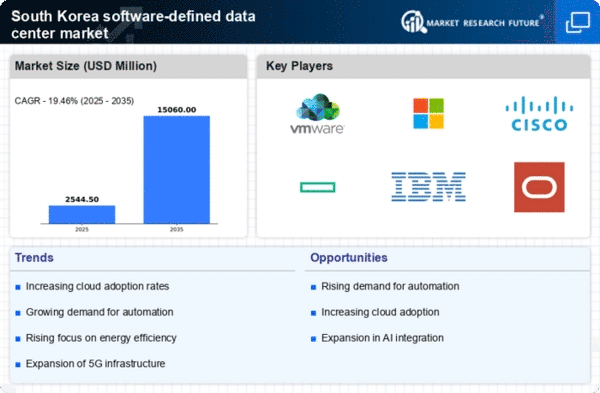Rising Demand for Scalability
The software-defined data center market in South Korea experiences a notable surge in demand for scalability solutions. As businesses increasingly seek to adapt to fluctuating workloads, the ability to scale resources dynamically becomes paramount. This trend is particularly evident in sectors such as finance and e-commerce, where rapid growth necessitates flexible infrastructure. According to recent data, approximately 70% of enterprises in South Korea prioritize scalable solutions to enhance operational efficiency. This rising demand for scalability not only drives investments in software defined-data-center technologies but also fosters innovation in service delivery models, ultimately shaping the competitive landscape of the software defined-data-center market.
Increased Focus on Energy Efficiency
Energy efficiency emerges as a critical driver in the software-defined data center market in South Korea. With rising energy costs and environmental concerns, organizations are prioritizing sustainable practices in their data center operations. The implementation of energy-efficient technologies not only reduces operational costs but also aligns with governmental initiatives aimed at promoting green technology. Reports suggest that energy-efficient data centers can reduce energy consumption by up to 30%, making them an attractive option for businesses. This focus on energy efficiency is likely to influence investment decisions and drive innovation within the software defined-data-center market, as companies seek to balance performance with sustainability.
Shift Towards Hybrid IT Environments
The software-defined data center market in South Korea is witnessing a significant shift towards hybrid IT environments. Organizations are increasingly adopting a combination of on-premises and cloud-based solutions to optimize their IT infrastructure. This hybrid approach allows for greater flexibility and cost-effectiveness, as businesses can allocate resources based on specific needs. Recent statistics indicate that around 60% of South Korean companies are integrating hybrid models to enhance their operational capabilities. This trend is likely to propel the software defined-data-center market forward, as it encourages the development of solutions that seamlessly integrate various IT environments, thereby enhancing overall performance.
Emergence of Edge Computing Solutions
The emergence of edge computing solutions is reshaping the software-defined data center market in South Korea. As the Internet of Things (IoT) continues to proliferate, the need for processing data closer to the source becomes increasingly critical. Edge computing enables organizations to reduce latency and enhance real-time data processing capabilities. Recent analyses suggest that the adoption of edge computing technologies could grow by over 40% in the coming years, significantly impacting the software defined-data-center market. This trend not only drives demand for innovative infrastructure solutions but also encourages collaboration between technology providers and enterprises, fostering a more interconnected digital ecosystem.
Regulatory Compliance and Data Sovereignty
The software-defined data center market in South Korea is significantly influenced by regulatory compliance and data sovereignty requirements. As data protection laws become more stringent, organizations must ensure that their data management practices align with local regulations. This necessity drives the demand for software defined-data-center solutions that offer robust compliance features. Recent surveys indicate that over 50% of South Korean enterprises consider regulatory compliance a top priority when selecting data center technologies. Consequently, this focus on compliance not only shapes purchasing decisions but also encourages vendors to innovate their offerings, thereby impacting the overall dynamics of the software defined-data-center market.

















